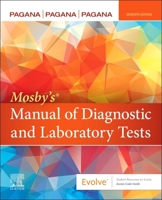Medical Microbiology
Select Format
Select Condition 
You Might Also Enjoy
Book Overview
Examines etiology, epidemiology, host defenses, identification, diagnosis, prevention, and control for each microbe in consistently organized chapters, enabling you to find the information you need fast.
Features summary tables and text boxes that emphasize essential concepts and learning issues, enabling you to make your exam review more efficient.
Correlates basic science with clinical practice through review questions at the end of each chapter to help you understand the clinical relevance of the organisms examined.
Uses clinical cases from literature reports to illustrate the epidemiology, diagnosis, and treatment of infectious diseases.Covers current refinements in vaccines - as well as the newest antibiotics - to provide you with the latest guidance in managing diseases such as community-acquired and opportunistic fungal infections, which pose increasing challenges in treatment
Provides more clinical photographs throughout that help you better understand the clinical applications of microbiology
Features revised artwork - more than 635 brilliant images, nearly all in full colour-that offers a more consistent and modern approach to the study of medical microbiology
Offers expanded use of summary boxes for bacteria throughout all organism chapters to further enhance your review and learning
Includes enhanced Student Consult features - self-assessment questions, clinical cases, animations showing the actions of various important toxins, and a PowerPoint presentation with supplemental images of organisms and stains
Customer Reviews
Rated 5 starsFantastic book ...
I used this book for my undergrad class and luckily my med school also uses this. As well as my husband has a previous copy that he used in med school. The text is very thorough, although it was lacking in a basic classification of bacteria, that would have been nice. (Like a chart of all gram - on one side and all gram +). Just gave a previous edition to a physician for reference and he loves it! I used this book in...
0Report
Rated 5 starsHow pathogens cause disease
The first thing to understand about this book is that it is a textbook and a difficult one. The difficulty for the beginning student or general reader is not a fault of the authors. Rather it is because medical microbiology itself is a daunting subject full of organisms that can only be seen fuzzily with an electron microscope, if at all, organisms involved in processes and behaviors that are foreign to our everyday experience...
2Report
Rated 5 starsIT'S SUPERLATIVE!
Without questions, this superlative text ranks among the finest and the most up-to-date package on medical microbiology. It demonstrates that this interesting branch of medicine can be both versatile and concise. The book is full of valuable illustrations which students can depend on for quick revisions. Ubiquitous tables, colourful charts and figures all help to accelerate comprehension. Also, there are two additional sections...
0Report
Rated 5 starsWonderful book on Medical Microbiology! A++
Title says it all. Excellent book for the microbiology student looking at infectious diseases. This book also comes with good use of pictures to describe diseases and their effects. I also would recommend Sherris Medical Microbiology - probably is slightly better, but has no pictures of what infectious disease symptoms look like, would need Atlas of Infectious Diseases the co-inside with that book.
2Report










![Paperback Medical Microbiology: With Student Consult Online Access [With Access Code] Book](https://i.thriftbooks.com/api/imagehandler/m/BDB4901B7A512F23190A524EEED4372D123D45DF.jpeg)


































